SEO experts use many different strategies to boost a website’s ranking on search engines. But some techniques are widely known and used, others are often overlooked and one of those is Latent Semantic Indexing (LSI) keywords. These are words and phrases closely related to your main keyword that help search engines better understand the context of your content. Using LSI keywords effectively able to improve your content’s connection, increase visibility, and provide you a competitive edge in search results.
In simple word, an LSI keyword is a word or phrase that is closely related to your main keyword. These related word help search engines understand the topic of your content more clearly, producing it easier like your page to rank higher in search results.
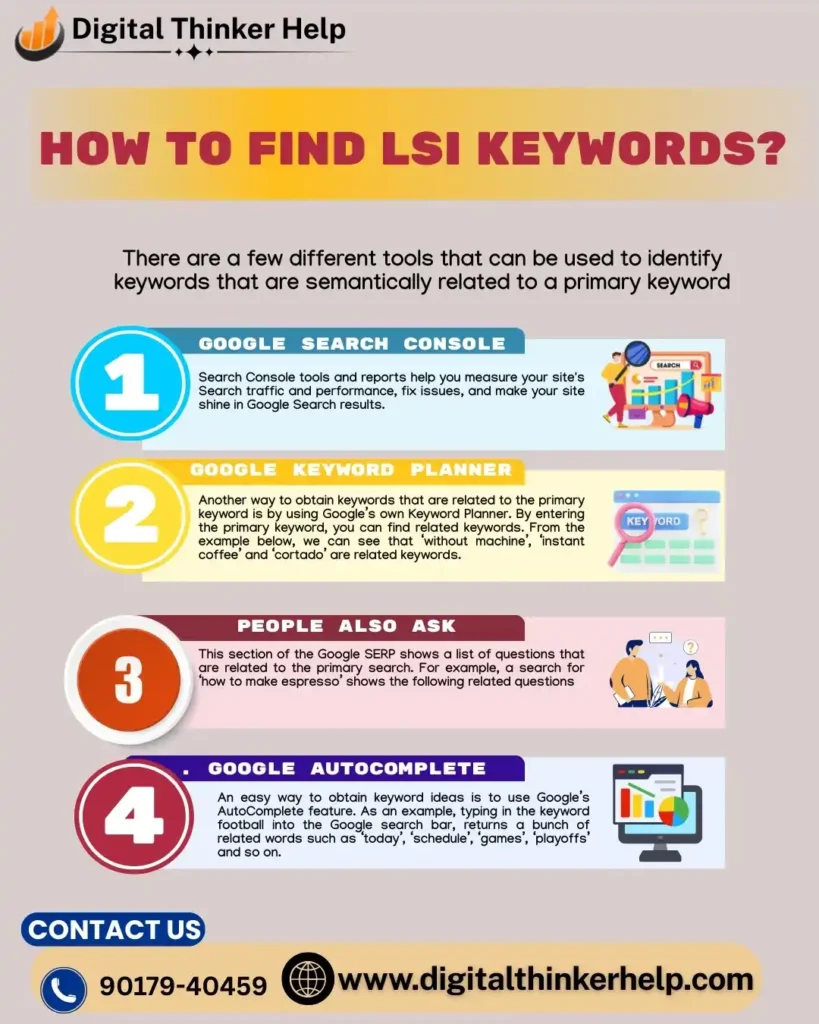
Put simply, LSI keywords are found by studying how people search over time. Search engines use smart algorithms to study search patterns and figure out which words and phrases are many times used together. This helps them understand the connection between different terms and improves how they deliver material search results.
Simply suggest, Google says that LSI keywords help its search engine understand what users are truly looking for. By including these related words on your webpage, you build it easier like Google to understand your content, which Capable improve your chances of ranking higher in search results.
What are LSI Keywords in SEO? Means
Definition: LSI (Latent Semantic Indexing) keywords are words or terms that are connected to a main keyword inside a specific context. Example, if your main keyword is “swimming,” related LSI keywords possibly “wade,” “dive,” “float,” “ocean,” “deep,” and “backstroke.” This related word help search engines better understand the topic of your ideas.
Also Read: Keyword Stemming Boost Your SEO with Examples
In simple terms, some LSI keywords it may be synonyms of the main keyword (like wade like swimming). But, they do not hold to be. The key point is that all these related words are commonly used in content regarding the main topic in this case, swimming and help search engines understand what your page is regarding.
As the name suggests, LSI (Latent Semantic Indexing) is a method used in natural language processing to understand the relationships between words. It was developed by Susan Dumais at Bell Labs in the late 1980s, equal before the Internet transformed into widely available.
Why Search Engines Use LSI Keywords?
Search engines began using Latent Semantic Indexing (LSI) keywords for two main reasons. To understand the meaning of content more exact and to show users more relevant search results.
This happened by reason of the old way of measuring content relevance keyword density was widely misuse by people trying to manipulate search rankings.
Because it helps Google and other search engines achieve their main goal: Display users exactly the information they are searching alike.
When Google first essay to build out how relevant a page was, it looked at how many times a particular keyword develop in that content.
As a result, website owners started overloading their content with keywords they preferred to rank for, a practice famous as keyword stuffing.
This practice created the content less helpful and created a big problem for the future of search engines.
What Is Latent Semantic Analysis (LSA)?
Latent Semantic Analysis (LSA) works as mathematical technique use that helps to find words, which are conceptually related in a text. Simply suggest, it helps identify words that hold similar meanings or appear in similar contexts these are many times referred to as LSI keywords.
Also Read: Natural Links Strategies to Boost Your SEO – Full Guide
LSA examines text to find meaningful patterns between words. This helps computers develop an artificial understanding of synonyms. Example, words like “income” and “earnings” many times show up in similar contexts, so the system recognizes them as related.
LSA also helps computers understand words that have multiple meanings. Examples, the word “bank” Capable of appear with finance, “savings,” and “rates” in a financial context, or with “river,” erosion and “sediment in a nature-related context.
Search engines like Google use various techniques to greater knowledge how words are related to each other.
How to Find LSI Keywords?
There are several tools available that can help find keywords closely related to a main keyword.
Here are a few:
Google AutoComplete
A simple path to receive keyword ideas is by using Google’s AutoComplete feature. Example, if you type “football” into the Google search bar, it will recommend linked word like “today,” “schedule,” “games,” “playoffs,” and more.
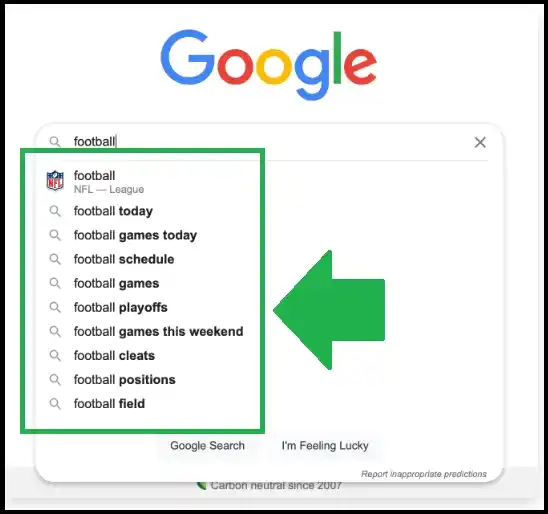
People Also Ask
This part of the Google search results shows a list of questions related to the main search query. Example, if you search for “how to produce espresso,” Google will display different, related questions people commonly ask.
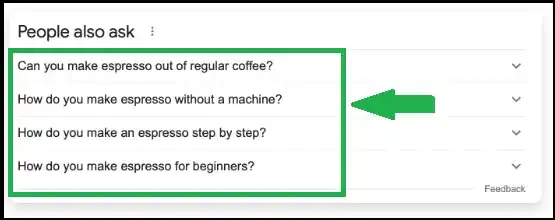
These questions provide key regarding related keywords, like “regular coffee,” “machine,” “step,” and “beginners.”
Google Keyword Planner
Another path to realize keywords connected to your primary keyword is by using Google’s Keyword organizer. By entering your primary keyword, the tool suggests related terms. Example, alike a search regarding espresso, related keywords strong include “without machine,” “instant coffee,” and “cortado.”
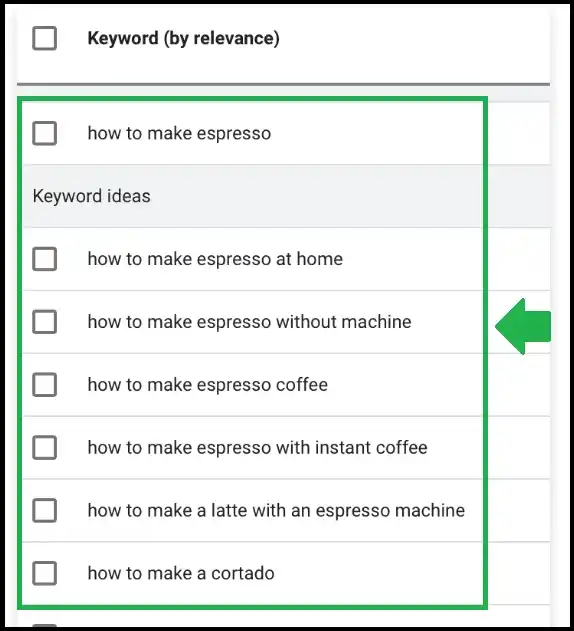
Google Search Console
Google Search Console shows you which keywords are bringing visitors to your website.
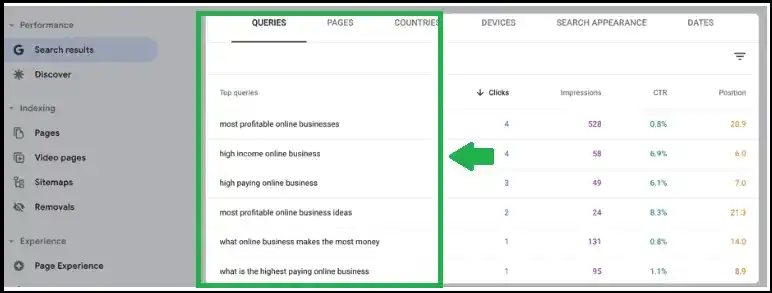
You can start by selecting a popular blog post from your website.
For example, in the case above, the chosen post is “Top 20 Most Profitable Online Businesses.”
You’ll be able to see all the keywords that are bringing traffic or impressions to that post.
Some of these keywords might not have been part of your original plan.
If you notice keywords you haven’t specifically optimized for, you can update your post to improve its ranking for these related terms.
How LSI Algorithms Work?
LSI algorithms search like words that many times appear together within the same content or context. They identify effects like synonyms (words with similar meanings) and Double (words with multiple meanings).
Also Read: Unnatural Links and Their Impact on SEO – Should be Know
A synonym is a word that hold the same or nearly the same meaning as another. Example, “dog” and “canine” are a synonym, which means that content regarding dogs capable of look in search results for the word “canine.”
LSI algorithms also identify polysemic words, which are words with multiple meanings. For example, “bank” can mean a financial institution or the land alongside a river, depending on the context.
However, LSI algorithms are able to tell the difference between these meanings by watching at the other keywords in the content. For example, an article about a bank as a financial institution usually includes related terms like “savings account,” “loans,” and “interest rates.”
On the other hand, an article regarding a bank as land across a river usually contains related words like “shoreline,” “riverbed,” and “stream.”
With this understanding, search engines capable of notice that these two types of content are different, even if they use the same main keyword.
What are Types of LSI keywords?
Here are the main kinds of LSI keywords you can use:
Synonyms: Words with Alike meaning (e.g., SEO → search engine optimization)
Related Terms: Related linked words (e.g., Coffee → espresso, cappuccino, latte)
Niche Keywords: Industry-special conditions (e.g., Digital Marketing → PPC, content marketing, funnel)
Entity Keywords: Names of brands, people, or places tied to a topic (e.g., Apple → iPhone, iPad, Mac).
Long-Tail Variations: Phrase-based LSI keywords (e.g., Best coffee makers for home use).
How to Add LSI Keywords into Your Content?
You can include LSI keywords in your content by using tools like Google’s “related searches” or other keyword research tools.
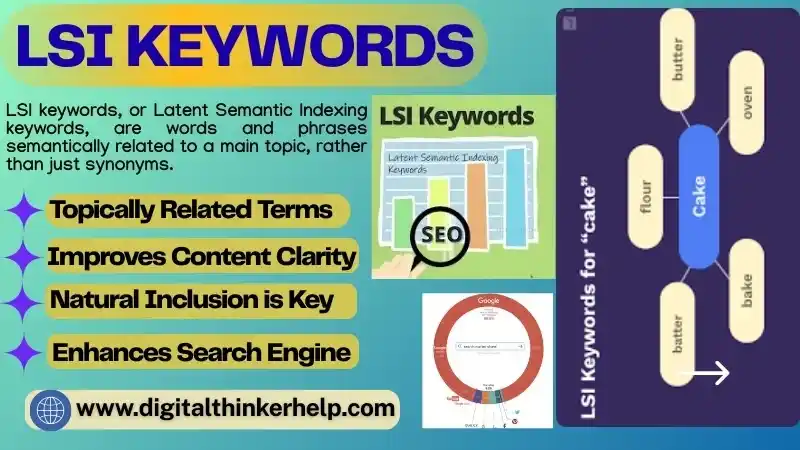
These keywords can be adding naturally in your headings, subheadings, and main content without over optimizing them. Other than, they can also add into image alt text, Meta descriptions, and FAQs to improve the overall their significance.
Produce sure the keywords fit naturally in your content and enhance understandability. This helps search engines understand your topic better and capable of improve your SEO performance.
What are Examples of LSI keywords?
Here are some LSI keyword examples for different topics:
Also Read: What is URL Slug? Best Practices for SEO with Example
Main Keyword: Digital Marketing
LSI Keywords: online marketing, SEO, social media marketing, PPC, email campaigns
Main Keyword: Coffee
LSI Keywords: espresso, cappuccino, caffeine, coffee beans, brewing methods
Main Keyword: Weight Loss
LSI Keywords: fat burning, diet plan, exercise routine, healthy eating, calorie deficit
FAQs (Frequently Asked Questions)
What Does LSI Stand For?
LSI stands for ‘Latent Semantic Indexing’ keywords are related words or idiom that helps to search engines realizes the context of your content.
Why Are LSI Keywords Important for SEO?
With using LSI keywords, your content compose more relevant, help improve search rankings, and minimize the keyword stuffing problems.
How Can You Find LSI Keywords?
You are use Google’s “related searches,” autocomplete idea, or keyword tools like LSIGraph to find related keywords.
How Many LSI Keywords Should We Use?
Include them naturally in your content usually 3–5 keywords for every 1,000 words without pressure them.
Where Should We Include LSI Keywords?
Use them in your headings, subheadings, main content, meta descriptions, and image alt text.
What Are LSI Keywords and Secondary Keywords?
LSI keywords are words that are closely related in meaning to your main keyword. Secondary keywords are additional keywords you want your content to rank for. While there capable of some overlap, they are not the same.
Secondary keywords are preferred mainly for their search volume and ranking potential, without directing on how closely they relate to the main keyword.
Summing Up
Latent semantic keywords play an important role in helping search engines follow and rank content. That’s why it’s important to use such them to improve your blog posts for SEO.
Also Read: What is Sponsored Links? Benefits, Risks, and Examples
By name keywords that are significant related, you are capable of better realize the full scope of your topic. This allows you to include suitable sub-topics in your content, which increases your articles authority on the subject and helps it rank higher in search results.
Adding LSI keywords to your content also helps it show up in related searches, which capable of boost your website traffic smooth more.


